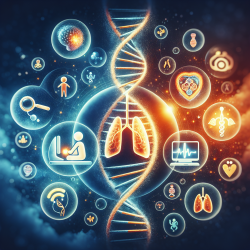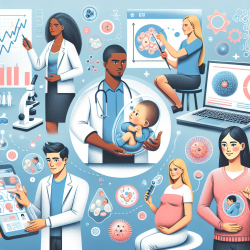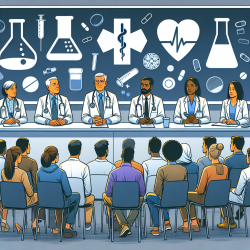As practitioners dedicated to improving children's health outcomes, it's crucial to stay informed about the latest scientific advancements. A recent genome-wide association study (GWAS) titled "Genome-wide association and large scale follow-up identifies 16 new loci influencing lung function" provides valuable insights that can be leveraged to enhance speech therapy practices. This study identified 16 novel genetic loci associated with lung function, offering a deeper understanding of the molecular mechanisms that may also impact speech and language development.
The Study's Key Findings
The study analyzed data from over 48,000 individuals of European ancestry and identified new regions associated with pulmonary function. These regions include genes such as MFAP2, TGFB2, HDAC4, and RARB, which are involved in various biological processes that could influence respiratory health. Importantly, these genetic markers were also found to have associations with lung function in children aged 7 to 9 years.
Implications for Speech Therapy
Understanding the genetic underpinnings of lung function can provide speech therapists with additional context when assessing and treating children with speech and language challenges. Here are some ways this research can be integrated into practice:
- Holistic Assessment: Consider genetic factors as part of a comprehensive assessment strategy. Children with identified markers may benefit from tailored interventions that address both respiratory and speech-related challenges.
- Early Intervention: Recognizing potential genetic predispositions allows for earlier intervention strategies that could mitigate long-term impacts on speech development.
- Collaboration with Geneticists: Work closely with geneticists to understand the broader implications of these findings and how they relate to individual cases.
Encouraging Further Research
The identification of these loci opens up numerous avenues for further research. Practitioners are encouraged to collaborate with researchers to explore how these genetic factors specifically influence speech and language development. Future studies could investigate:
- The interaction between these genetic loci and environmental factors affecting speech development.
- The potential for targeted therapies that address both respiratory and speech difficulties concurrently.
- The role of these loci in other developmental disorders that may impact communication skills.
By staying informed and actively participating in research efforts, practitioners can contribute to a growing body of knowledge that ultimately enhances therapeutic outcomes for children.
To read the original research paper, please follow this link: Genome-wide association and large scale follow-up identifies 16 new loci influencing lung function.










